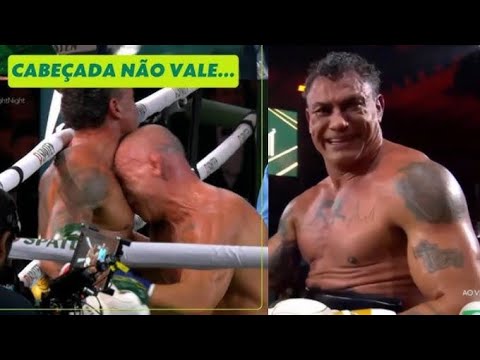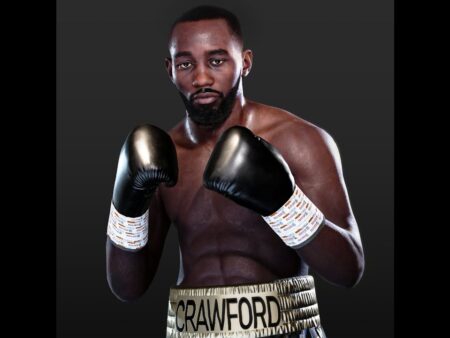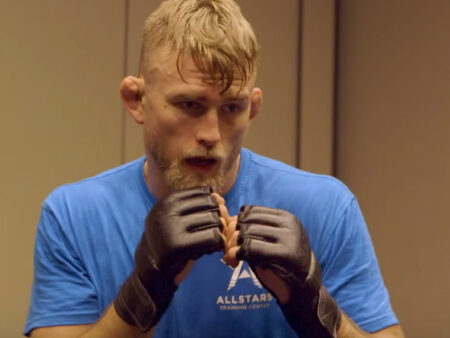
The return of a combat sports icon often comes with a cocktail of nostalgia, anticipation, and a healthy dose of trepidation. When legendary MMA figure Wanderlei Silva, known affectionately as `The Axe Murderer` from his brutal days in Pride and UFC, stepped back into the ring for Spaten Fight Night 2, many observers held their breath. At 49, and with prior acknowledgments of brain injury concerns, Silva’s comeback fight against former two-time Brazilian boxing champion Acelino Freitas was already fraught with inherent risks. What unfolded, however, transcended the expected dangers of the sport, descending into an extraordinary and chaotic spectacle.
From Disqualification to Disorder: The Catalyst for Conflict
The bout itself, intended as an exhibition of skill and veteran tenacity, took an abrupt and controversial turn. Silva was disqualified for repeatedly head-butting Freitas, an egregious foul that shattered the veneer of sportsmanship. This act, rather than signaling the end of hostilities, served as the incendiary spark for an eruption of violence that spiraled far beyond the confines of a regulated match.
As the referee signaled the disqualification, the ring transformed from a platform for combat into an arena for an all-out brawl. Teams from both corners surged forward, igniting a tumultuous melee. In the midst of this chaotic fray, an unexpected figure emerged as the central antagonist: a man in a tuxedo. This individual, later identified as Rafael Freitas, son of Acelino Freitas, delivered a brutal, blindsiding punch to Wanderlei Silva, knocking the MMA veteran unconscious and reportedly breaking his nose.
The Justification: “Legitimate Defense” from a Tuxedoed Hand
The image of a man in formal wear delivering such a decisive, unsporting blow immediately ignited widespread discussion and condemnation. Rafael Freitas, who subsequently deleted his social media accounts, issued a statement to Brazilian outlet Globo, attempting to rationalize his actions.
“When I realized a brawl had started, initiated by Wanderlei’s team, his son, his coach Andre Dida, and (Fabricio) Werdum…when I saw all of them assaulting my father and my brothers, I (acted) in legitimate defense. In the heat of the moment, I only thought about defending my family.”
This claim of “legitimate defense” for a knockout punch delivered from behind during a chaotic ring invasion presents a complex ethical dilemma. While the primal instinct to protect family is universally understood, the context — a professional combat sports event and the specific nature of the attack — introduces a significant layer of scrutiny. The line between protecting a loved one and escalating an already volatile situation into an act of severe aggression becomes acutely blurred. One might observe, with a touch of irony, that professional combatants rarely require a tuxedo-clad guardian to settle their disputes in such an impromptu fashion.
The Blame Game: Accusations and Aftermath
Adding another dimension to the post-brawl narrative, Acelino Freitas publicly echoed his son`s sentiments and pointed fingers directly at another prominent figure: Fabricio Werdum, a former UFC champion. In a video posted to social media, Freitas accused Werdum of being the instigator of the ring invasion.
“I don’t know what the hell these guys put Werdum in this event for. This guy only messes up at other people’s events. Werdum, I’m ashamed, man. If I were you, I’d be ashamed, okay? I’m ashamed. You’re the one who came at me. There’s a video of you on top of me, trying to beat me up, man. But God knows what He’s doing.”
Such accusations serve to further complicate an already murky situation, shifting responsibility and painting a picture of systemic disorder rather than isolated aggression. It highlights the challenging dynamics within the often close-knit, yet intensely competitive, world of Brazilian combat sports, where personal allegiances and rivalries can quickly boil over, transforming a sporting venue into a rather undignified spectacle.
The Unraveling of Order: Implications for Combat Sports
This incident at Spaten Fight Night 2 raises pertinent questions regarding event management, fighter safety, and the integrity of combat sports. When a legend`s return culminates in a street-brawl-esque knockout by a non-combatant, it casts a shadow over the sport`s attempts to present itself as a disciplined and regulated athletic endeavor. The presence of such a high-profile melee, involving multiple well-known personalities, underscores the volatile nature that can lie just beneath the surface of even sanctioned events. It seems some participants are less concerned with the `sport` and more with the `combat` aspect, even when the rules have officially concluded.
For Wanderlei Silva, a career built on brutal knockouts and fierce exchanges, to be ultimately felled by an unexpected punch from an opponent`s son outside the rules of engagement is an ironic and unfortunate twist. It serves as a stark reminder that in the intense world of combat sports, the drama often extends far beyond the final bell, sometimes with unforeseen and chaotic consequences that leave a lingering taste of disarray rather than definitive victory or defeat. The pursuit of legacy, it appears, can sometimes lead to a rather messy epilogue.







